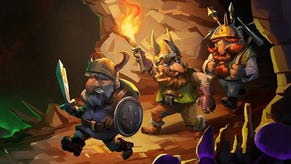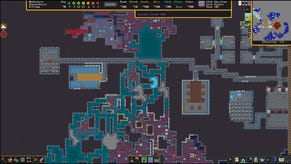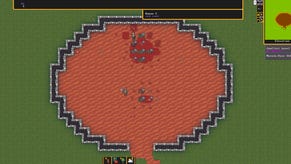RPS Chat: Why Proc Gen Poetry Matters In Dwarf Fortress
Great Odes
Dwarf Fortress is a titan of PC games, famous for among other things its complexity, its decades-long development plan and its procedural world generation. In light of some coming additions - procedural, culture-specific forms of poetry and dance - Adam and Graham decided to discuss why such seemingly minor detail is exciting and important.
Adam:I want to talk about Dwarf Fortress, which isn’t particularly novel. I spend a lot of time either wanting to talk about Dwarf Fortress or actually talking about Dwarf Fortress. Often in a pub. People don’t understand what I’m saying but I say it anyway.
But right now, I have specific things on my mind and this all goes back to a post of yours about the procedural poetry generation that is being programmed into the game. The most recent posts - and I’ll quote from them in a minute - go into detail about the kind of things that the new systems will do.
The thing that stood out to me is a teaching system. A poet can start a movement and then students will gather, form a group, learn the new style of poetry, and go out into the world. Then they might start their own group, with their own students, and the style propagates through the world, with individuals picking it up and altering it - it can cross from one species to another and there will be specific poets and poems who integrate their personal and cultural experiences into their work.
I don’t think I’d be human if that didn’t make me excited and I definitely wouldn’t be me if I didn’t start thinking about where I’d seen something like this before. And then I realised - it was NOWHERE. I can’t think of any game that’s doing anything quite like this. And that’s Dwarf Fortress in a (very large obv) nutshell. It’s doing so many things and so many of them aren’t being done anywhere else.
So that’s what I wanted to talk about.
Graham: Dwarf Fortress' world generation is probably my favourite thing in all of videogames. Sure, its landscape generation is impressive, but there are a thousand games doing that now. Dwarf Fortress remains only of a handful generating history for that world, and yes, like you say, the only one that seems to be mimicking the change and spread of actual culture.
That said, my main interaction with that generation is through the menu interface it gives you to browse through its simulated wars, civilizations, cities, famous figures. When I actually get down to the business of playing in the traditional sense, my attention is more focused on 'oh no I need food' and 'oh dear they're all killing each other'.
So I suppose the obvious question - which I'm happy to ignore because I love it, but others are less so inclined - is whether all this generation work is worth it? Does it bother you at all that Dwarf Fortress has unique forms of dwarven poems but not a functionally usable interface, for example?
Adam: This is where I let you in on my big Dwarf Fortress secret. I’ve been playing it for years and it’s one of the few games I still spend time reading about on a weekend when I’ve switched off my work-brain - BUT I’m absolutely terrible at Fortress mode. I mean, just abysmally, horrifically, catastrophically bad.
I’ve been playing for long enough that I can put a functional fort together and things will tick along quite nicely for a while but that’s about it. When it comes to the grand narratives I experience them by proxy. So a lot of my interest is focused on Adventure mode - playing as if it were a more traditional roguelike.
And I think in that sense, this stuff is important to me. It’s the difference between finding a dungeon with rooms that are slightly different shapes, and have skeletons in different places, or finding a group of people who can - in their crude copy-paste fashion - talk about their family and their foes. Anything that adds to that and makes the world, and the exploration of the world, feel worthwhile is important.
Never forget the importance of silliness either. How great is it to play a game and be the one person in the world who ever hears that one poem about the one-legged elephant that drank a sea of lava and then burst into flames. And is now revered as a god for reasons unknown.
Ideally, the interface would be the priority but in Adventure mode it’s fine anyhow - and Fortress mode has...mods? I guess? I’m so behind on the scene.
Graham: There are third-party applications that make it usable to varying degrees. I'm much like you, though - terrible at Fortress mode, more recently focused on Adventure, and more than happy to let Tarn Adams work on whatever he wants in whatever order he wants.
The silliness is a salve for this also, because everything is more tolerable when it's funny. Dwarf Fortress is well-known for its production of funny anecdotes through play, but it's at least as well known for the silliness inherent in its development. Its mere existence is absurd. Its development blog is a kind of wondrous joke, and entertaining in ways entirely independent of the game being made. You can't be cross about the project's development priorities. Do you have quotes from the recent poetry update you'd like to share?
Adam: Yes. Some of them are about dancing. First of all, there’s a small update that goes some way toward answering your initial question. Would this impact on a player’s Fort? Not that you said that, but it was kinda in there.
“I've finished up the teacher-student links and decided to augment that with the formation of performance troupes that can gallivant about. You'll also see them in your forts when we get to that part. A group of goblin poets had the honor of making the very first one, and they decided to call themselves the Fungi of Hell. After fourty years, five of the original eight founding members had met violent ends (including one that ended up in an elf belly), and another had left to become a baron at a dwarf fort, but they were still going strong with new members, including some bards and dancers and poets-turned-bard and so on.”
So troupes will visit Forts, which could lead to all kinds of different possibilities - entertainment to break that master craftsman out of the funk that’s consuming him; a huge war between dwarfs and entertainers because why not; or maybe you’d be able to trap them all inside a single room and send people to watch them dancing and reciting whenever they needed to be cheered up. See if you could make them devise entirely new poetic forms based around their imprisonment.
Perfect for the evil character who needs a new kind of monument to his wicked ways.
And then there’s a whole story about a new form of poetry, which begins like this:
“While toying around with the art book code and poem/etc. composition, I thought I'd see what happens to an entire form created by an artist mid-world-generation when the only way the form can be passed around is between teachers, students and troupe members. Most of these non-civ forms tend to stay within a single troupe, but sometimes they break out. For instance, in a 200 year small world, we had a human from a hamlet named Usmen decide to run away from home and study goblin poetry.”
I instantly want to know more about that. What could it mean? I actually care about what it means!
This update probably excites me so much because it’s a big change from fluid simulation and mapping tree growth and forest expansion. There was a changelog a while ago about simulating individual leaves that fall from trees. That’s great and all but the movement and shaping of ideas is on another level - it’s far more interesting. I guess part of this - as is often the case with exciting things - is that I’d love to see similar things elsewhere.
Ultima Ratio Regum is perhaps the other great hope?
Graham: Indeed. URR is the only other game that seems to be approaching this stuff. It's a 4X roguelike that generates worlds, civilizations, cities, history and so on, but is doing similar things in terms of drilling down on certain details. So, for example, civilizations have procedurally generated flags; there are procedural ziggurats to explore, which contain procedural environment puzzles and procedural riddles to offer hints to players trying to solve them; and its use of ANSI-not-ASCII graphics means that its crops, its keys, the vines which grow on the sides of its stone, are all procedural too.
I find URR generally less silly in its approach or style though, despite similar ambitions. There seems to be more method to each part. Still, the effect is the same, or will be: a world which seems inhabited by and shaped by people, rather than the cold feeling of white noise you sometimes get when exploring a world built by a random number generator.
Here's an example from a recent URR development post, which also neatly summarises the goal of its procedural generation and where perhaps it and Dwarf Fortress differ from other games:
In keeping with my mission to push procedural generation away from the “classics” – monsters, dungeons, levels – and towards more “qualitative” concepts that have never been generated before in games (nations, cultures, societies…), URR (as regular readers know) contains a range of procedurally generated religions. These are not just a name and a belief, but are designed to be complex, interwoven and often competing systems that procedurally generate a deity or pantheon of deities; their beliefs and forms of worship; what, if anything, is banned in their religion; what festivals (if any) they perform; what agendas the clergy of this religion have; what other religions they might consider to be infidels; where in the world the religion is found; the religious symbol; their cosmogenic and eschatological beliefs; what heretical sects within that religion exist; and – the focus of this blog entry – their altars.
If videogame design is broadly about building systems for serving and manipulating all other forms of media, then this kind of procedural generation feels in some ways like the next step: building systems for serving and manipulating all the muck of humanity and our society. Is that why they're so exciting? I used to jokingly say that Dwarf Fortress would eventually contain all other games; will DF and URR also eventually replicate all human culture, like a million procedural monkeys working at a million procedural writing devices unique to their monkey cities?
The conversation continues on page two.
Adam: If the dwarves ever start making boardgames, I’ll be alarmed. But I can imagine it - their own versions of Go and Chess. Then people would take the rules and make physical versions. It’s terrifying. Makes me glad that there isn’t an enormous Minecraft-level DF community because Dwarf-Con would be so intimidating. People performing procedurally generated dances that they once saw an elf performing in one of a hundred billion worlds.
I think the appeal to me is linked to the joy I took from flipping through an atlas when I was a kid. The world felt big enough to be effectively infinite and seeing maps of these places and demographic details - before I even knew what demographic meant - was really exciting. I’d play little games, looking at a range of mountains and tracking the best path through, or wondering how long it’d take to swim across a particular stretch of water. I used to draw little rules on the page, next to the maps, which must have been really really annoying for the next person who borrowed them from the library.
What a dick.
But I think that’s important, the link back to those memories, because they were such pure forms of play. And when we talk about DF and URR like we are now, there’s the danger of putting people off because everything sounds so bloody enormous and complex. Well, it is, but so is an atlas and so is a bucket of Lego. Depending on how you look at it. But the actual pleasure that comes from playing with those things, or simply looking at them, can be a very simple pleasure.
Anyone who has ever enjoyed a map, a page of history, a character sheet or an RPG monster compendium can enjoy DF. It’s a brilliant toybox and there’s no pressure to perform miracles with it. You can just make the toys idle around. In fact, you can just allow the game to make the toys perform for you, to an extent.
I’m not sure if there was a particular point I wanted to make at the start of this, or even if one of us might have accidentally made it already. I think the “muck of humanity” line that you came up with is close to it. DF, for all that it can be silly, is examining ideas about creation and culture in ways that Civilization and the like never have. And that’s not a criticism of Civ - it’s never attempted to do those things - but I wonder why parts of DF haven’t been mimicked. Is it because it’s too difficult to mimic? Or because the discrete parts aren’t as interesting as the elaborate whole?
One thing about DF that often goes unmentioned is that it’s really bloody good at doing what it does. It’s not just acclaimed because it’s out there on its own - it’s acclaimed because it’s a very smart program.
Graham: I've definitely mentioned it before, but one of my favourite books is the Atlas of Remote Islands. Here's the description from its publisher: "On one page are perfect maps, on the other unfold bizarre stories from the history of the islands themselves. Rare animals and strange people abound: from marooned slaves to lonely scientists, lost explorers to confused lighthouse keepers, mutinous sailors to forgotten castaways; a collection of Robinson Crusoes of all kinds."
The stories are a mix fact and myth but are each treated equally. I feel an overwhelming sense of sehnsucht when reading it - a hard-to-describe mixture of sadness and romanticism, of nostalgia for places never been, of kinship with and alienation from humanity in all its forms. Its stories of disease, madness, and horrible, sturdy humanity makes it, I only realise now, reminiscent in some ways of the stories Dwarf Fortress spawns and players spawn within it. It is a very human game.
As for why others haven't aped the best parts of Dwarf Fortress, I fear the boring answer comes back to my question at the start and why I'm OK the Adams brothers taking as long as they want to work on whatever they want. I think having no time limit on anything is the flux capacitor of Dwarf Fortress; it's what makes strange, generative flights-of-fancy possible, while other developers worry about trifling things like "finishing the game ever." And even in an age of Early Access and games-as-services, how many developers want to lock themselves away like a dwarf in a mood and commit themselves to a 30-year masterpiece?
You are right also, of course, that Dwarf Fortress is very good. That does get missed too often in favour of treating it as a novelty, or focusing solely on its capital-I Importance.
Adam: I would scribble all over that book.
There’s something of Borges in Dwarf Fortress as well. We haven’t talked about the creatures but they’re as much a part of the appeal as the world itself, for me. I’m talking about the Legendary Beings, godlike things that are sometimes Lovecraftian and sometimes downright hilarious, and everything in between.
The chance of seeing one, particularly in Adventure mode, is vanishingly small, but it’s important that they exist. Refer to Borges’ Book of Imaginary Beings: “"We are ignorant of the meaning of the dragon as we are ignorant of the meaning of the universe, but there is something in the dragon's image that appeals to the human imagination … It is … a necessary monster."
That’s true of those legendary creatures in Dwarf Fortress. If I didn’t know they were out there, I’d be much less interested in playing, even though I’ll almost certainly never meet one. They’re the almost-invisible truth that anything is possible, like the Void Creatures mentioned in Elite documentation. I don’t even know if they’re in the game and I don’t think players should know if they’re in the game really, because the thought that they might be makes existence so much more exciting.
Mystery is part of the appeal as well, isn’t it? Especially in an age when content and features are so often known in advance, the enormity of something like DF, along with its many random generation systems, means that it’s full of unknown things, whether they’re lurking in the dark depths of a new (old) world, or doing a jig in an elven village.
Graham: There it is, that's why every little bit of generation matters. It's in service of a world that is larger than us, unknowable, and so full of surprises, longing, mystery in place of mastery. It has secrets, but not those placed with the purpose of being found. It has secrets because the world is very large and we're all small and will die soon. Yes?
Adam: Yes. Remember when we said that it was important to remember that Dwarf Fortress is silly as well as serious?
It isn’t. It’s mortality and cultural death written in code.
Dwarf Fortress is FREE and out and you owe it to yourself to try it, even if only to prod it towards world generation and to survey the results.















.jpg?width=291&height=164&fit=crop&quality=80&format=jpg&auto=webp)